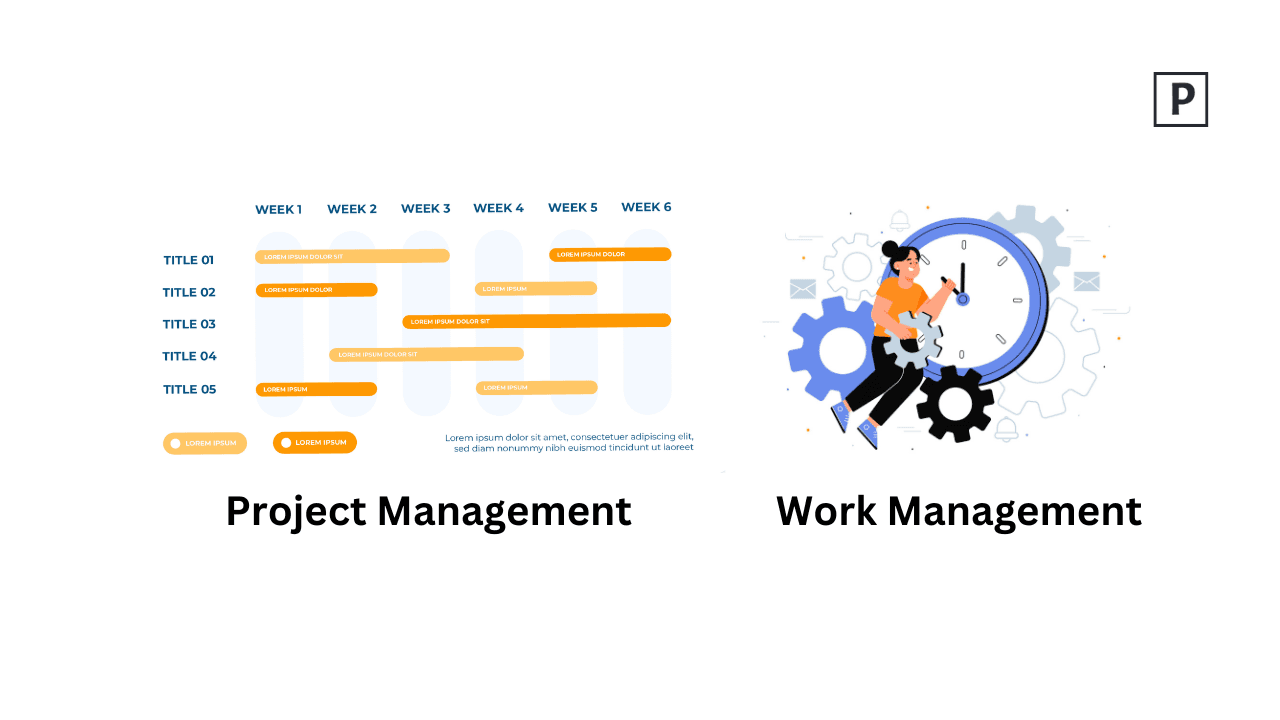Many businesses struggle with inefficiencies and misalignment in their workflows, leading to missed deadlines and decreased productivity. The increasing complexity of modern work environments often exacerbates these challenges, making it difficult to keep processes streamlined and goals aligned.
To address these issues, understanding the key definitions of work management becomes essential. By grasping these fundamental concepts, businesses can better leverage robust work management software to enhance their processes, improve productivity, and ensure alignment with their goals.
Differentiating Work Management from Project ManagementCore Components of Work ManagementEnhancing Collaboration and CoordinationManaging Workflows and AutomationMetrics for Success in Work ManagementConclusion
Differentiating Work Management from Project Management
Project Management focuses on achieving specific goals within defined timeframes and budgets, often using methodologies like Agile or Waterfall. It’s about delivering a unique outcome, such as launching a product or completing a construction project. The scope is often rigid, with clear stages, deliverables, and end dates.

Work Management, on the other hand, is more comprehensive. It deals with all aspects of work within a business, including ongoing operations and daily tasks that might not be project-specific. Work management doesn’t necessarily have an endpoint; it’s about continuously optimizing processes, tasks, and resources across various functions.
While project management is concerned with “what needs to be done” for a particular project, work management is about “how everything gets done” across the business. This includes aligning day-to-day activities with broader organizational goals, ensuring that even routine tasks contribute to overall success.
Work management software cater to this broader approach by integrating various functions like task assignment, resource allocation, and time management, allowing for seamless operation across different teams and projects. They provide a holistic view, helping businesses to not only complete individual projects but to ensure all ongoing work is aligned, efficient, and productive.
Core Components of Work Management
Task Management: This is about breaking work into smaller, manageable tasks, assigning them to the right people, and tracking progress. Effective task management ensures that nothing is overlooked and that each team member knows their responsibilities and deadlines. It also helps in identifying potential bottlenecks or delays early, allowing for timely intervention.
Resource Management: Involves careful planning and monitoring of how resources—whether human, financial, or material—are allocated and utilized. Effective resource management ensures that every resource is used efficiently, reducing waste and ensuring that projects have what they need when they need it.
Time Management: Critical for maintaining productivity and meeting deadlines. This involves scheduling tasks, setting priorities, and ensuring that work is completed on time. Time management software within work management systems help teams track how time is spent and identify areas where efficiency can be improved.
Work management software integrate these elements, providing a centralized platform where all these components can be managed cohesively. This integration ensures that tasks are completed on time, resources are used efficiently, and the business can maintain control over its work processes, even in complex and dynamic environments.
Also Read: Defining Work Scope for Efficient Project Management
Enhancing Collaboration and Coordination
Collaboration is about bringing teams together to work towards a common goal, leveraging each other’s skills and knowledge. In work management, collaboration is crucial because it ensures that all team members are aligned, reducing the risk of duplicated efforts or miscommunication.
Coordination involves organizing the work of different teams or individuals so that their efforts contribute to the business’s overall objectives. Without effective coordination, even the most well-intentioned collaboration can result in chaos. Work management software addresses this by providing shared workspaces, real-time communication channels, and collaborative task management features. This ensures that all team members have access to the information they need and can work together effectively.
This software also helps in breaking down silos within businesses, ensuring that information flows freely between different teams. By centralizing communication and collaboration, work management software ensures that everyone is on the same page, leading to better decision-making and more efficient work processes.
Managing Workflows and Automation
Workflows are the sequences of tasks that must be completed to achieve a particular outcome. Effective workflow management ensures that tasks are completed in the right order and at the right time, minimizing delays and bottlenecks.
Automation within work management software helps streamline workflows by handling repetitive tasks automatically. This reduces the risk of human error, speeds up processes, and frees up team members to focus on more strategic work. For example, work management software might automatically assign tasks to the appropriate team members based on predefined rules or send notifications when a task is completed.
By visualizing workflows, these software make it easier to identify inefficiencies and make necessary adjustments. This not only improves the efficiency of individual workflows but also enhances the overall productivity of the business.
Metrics for Success in Work Management
To ensure that work management efforts are effective, businesses need to track specific Key Performance Indicators (KPIs).
Task Completion Rates: This metric measures how effectively tasks are completed within the planned timeframes. High completion rates suggest that workflows are efficient, while lower rates may indicate problems that need to be addressed.
Resource Utilization: Tracks how effectively resources are used. High utilization rates suggest that resources are being used optimally, while low rates may indicate underuse or inefficiencies.
Time to Completion: This metric measures how long it takes to complete tasks or projects, providing insights into the efficiency of work processes.
Work management software provides real-time data and analytics on these KPIs, allowing businesses to identify areas for improvement and make data-driven decisions. This continuous monitoring is crucial for maintaining a high level of productivity and ensuring that work processes align with organizational goals.
Also read: Essential Work Management Skills for Professionals
Conclusion
While project management focuses on specific, time-bound goals, work management encompasses the broader, ongoing operations that ensure organizational efficiency and alignment. By integrating task, resource, and time management, alongside enhancing collaboration and automating workflows, work management software provides a comprehensive approach to optimizing work processes.
They offer crucial metrics for success and customizable features that adapt to unique organizational needs. Leveraging these tools effectively can significantly improve productivity and operational alignment, driving sustained success across diverse work environments. Continuous improvement based on user feedback further ensures these tools remain relevant and valuable over time.
Explore how a powerful work management software like Pinrom can transform the way you do business.
